Nov 2017 2nd Edition
Nov 2017 2nd Edition Estelle Greeff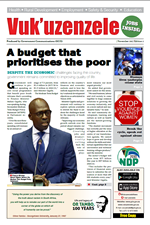
Translations
A budget that prioritises the poor
A budget that prioritises the poor JoyDespite the economic challenges facing the country, government remains committed to improving quality of life.
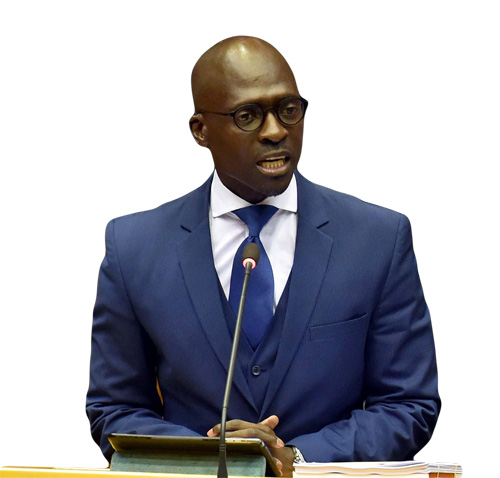 Government will continue to protect spending on core social programmes that benefit poor South Africans that's according to Finance Minister Malusi Gigaba, who was speaking during his maiden Medium Term Budget Policy Statement (MTBPS) in Parliament recently.
Government will continue to protect spending on core social programmes that benefit poor South Africans that's according to Finance Minister Malusi Gigaba, who was speaking during his maiden Medium Term Budget Policy Statement (MTBPS) in Parliament recently.
“Over the next three years, consolidated spending will increase by an annual average of 7.3 percent, from R1.6 trillion in 2017/18 to R1.9 trillion in 2020/21,” said Minister Gigaba.
The Medium Term Budget reflects on the country’s finances and economic outlook, and to how the outlook supports the country’s national development objectives as articulated in Vision 2030.
Minister Gigaba said government will continue to explore options available to stretch the Rand to address the challenges faced by the majority of South Africans.
“Improving our economic growth outlook over the period ahead remains our biggest challenge. Creating jobs and dramatically rolling back the tide of unemployment remains our most urgent priority.”
He added that government cannot do this alone.
“We need business, labour and civil society to come together to forge common solutions to growing the economy inclusively, and on a more radical and sustainable basis,” he said.
He said community development, learning and culture as well as health are the fastest-growing functions.
“The student movement has correctly put the issue of higher education at the centre of our transformation agenda. We cannot hope to grow and develop without the skills and intellectual capabilities that our universities and technical training colleges produce,” said the minister.
The sector’s budget will grow from R77 billion this year to R97 billion in 2020/21.
“This includes the provision of financial assistance to subsidise the education of more than 450 000 students every year,” said Minister Gigaba.
However the minister is convinced that much more needs to be done.
“Although the fiscal constraints we face are real and binding, we must make every effort to ensure that no academically deserving student is excluded due to financial constraints.”
Infrastructure investment
When coming to infrastructure investment, the minister said the estimated expenditure of R948 billion over the medium term expenditure framework (MTEF) constitutes 5.9 percent of gross domestic product (GDP) over the same period.
Minister Gigaba said the lion’s share of economic infrastructure is provided by state-owned companies, which are projected to spend R402.9 billion over the MTEF.
The education sector is expected to spend R44 billion on building new schools and refurbishing existing buildings, libraries and laboratories.
Municipal spending is projected to rise to R197 billion, while the provinces are anticipated to spend R208 billion.
Government is embarking on several new initiatives to improve the quality of its infrastructure spending. This includes:
- the maintenance of existing infrastructure
- improved procurement and
- better conditional grant terms to eliminate inefficiencies and underspending.
“Cabinet has approved a budget facility for infrastructure, which aims to overcome shortcomings in the planning and execution of large infrastructure projects," said Minister Gigaba. "It has begun considering proposals in, among others, water, rail development, broadband, magistrate and high court construction and refurbishment.”
Medium-term priorities include completing infrastructure projects and maintaining and rehabilitating police stations, courts, military bases, health and correctional facilities.
Sign up for set-top TV
Sign up for set-top TV JoySibonelo Masondo (68) is a pensioner who loves sport on television and watching his favourite soccer teams play is the only thing he looks forward to every weekend.
 But poor television signal at his village means Masondo is unable to fully enjoy the games. He is one of many South Africans living in remote parts of the country who are subjected to a poor quality TV picture and radio signal. This is one of the reasons South Africa has joined hundreds of other countries in moving from an analogue television signal to a more efficient digital terrestrial television (DTT) signal.
But poor television signal at his village means Masondo is unable to fully enjoy the games. He is one of many South Africans living in remote parts of the country who are subjected to a poor quality TV picture and radio signal. This is one of the reasons South Africa has joined hundreds of other countries in moving from an analogue television signal to a more efficient digital terrestrial television (DTT) signal.
From the 1970s, when TV started in South Africa, the country used analogue signals and some broadcasters such as SABC TV and radio stations are still using this technology. Government is now in the process of making the transition to DTT and the Department of Communications has been tasked with ensuring all South Africans are able to make the switch.
Better quality TV and radio
Digital migration will allow users to experience the many benefits of digital television, which includes clearer pictures and sound as well as more channels. It’s similar to the movement away from record players to CD players – which have made the music listening experience a whole lot better.
"It’s a whole new experience that we want South Africans to enjoy," said Communications Minister Mmamoloko Kubayi-Ngubane.
Speaking in Bizana in the Eastern Cape, where she led a DTT awareness campaign, she said, “We need all South Africans to know that digital migration is here, the project has not stalled. We are going to make sure that we migrate everyone.”
Set-top box decoders are needed to continue watching television when South Africa fully switches to DTT. These boxes will give access to more than 18 television channels, including the SABC, e.tv and community channels.
The registration of households for digital television decoders started over a year ago in the Square Kilometre Array (telescope area of the Northern Cape) but registration has been slow.
“The numbers are actually quite low; that is why we are constantly on the road to raise awareness and register people," said the minister. "We want people to understand that they need to go and register for them to receive these decoders." She visited several households in the Bizana area where the minister took it upon herself to register beneficiaries.
Freedom and protection are constitutional rights
Freedom and protection are constitutional rights JoyOur Mid-Term Budget Policy Statement was delivered by Finance Minister Malusi Gigaba recently. It called on all of us to work together to re-rationalise our resources and accelerate all our efforts as government in this penultimate month of the year to conclude most of our programmes before the start of the festive season.
Working together, in this fashion will put us in a good position at the end of the financial year in March 2018. We should continue to work hard to serve our people so that they end the year on a positive note.
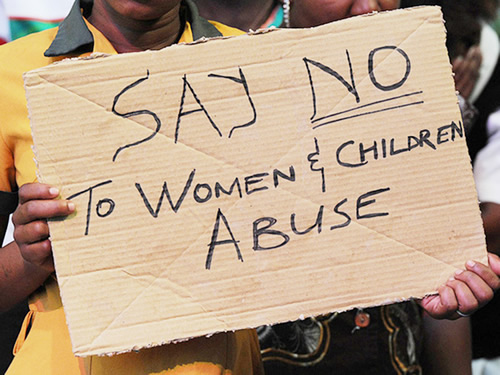 By all means and at all times public servants have to be vigorous and must be loud defenders and advocates of the interests of the people, both in what they say and in what they do. Despite our efforts in terms of delivering services to the poor, the challenges our country faces are not in any way significantly diminishing. Others are becoming increasingly unpredictable, such as natural disasters, protests from various sectors and of course unacceptable levels of crime, among many other aspects.
By all means and at all times public servants have to be vigorous and must be loud defenders and advocates of the interests of the people, both in what they say and in what they do. Despite our efforts in terms of delivering services to the poor, the challenges our country faces are not in any way significantly diminishing. Others are becoming increasingly unpredictable, such as natural disasters, protests from various sectors and of course unacceptable levels of crime, among many other aspects.
In this month of November we also launch the 16 Days of Activism for No Violence Against Women and Children (16 Days of Activism Campaign for 2017). Despite this campaign having run for 18 years, crimes against women and children are still
continuing. This is why we said the 16 Days should actually be the culmination of our 365 day campaign, under the theme "#CountMeIn", Count Me In: Together Moving a Non-Violent South Africa Forward. This contributes to the message of social cohesion and nation-building through the call we make on all South Africans to actively advocate for and reject violence against any vulnerable persons, particularly women and children. We cannot build a free and better society where significant sections of our people are still not realising their constitutional rights to freedom and protection in their own country.
This year the 16 Days of Activism calendar will be launched in the Eastern Cape on 25 November 2017, in line with The Year of OR Tambo theme and the emancipation of women. President Tambo was a champion not only of the right of women to equal political participation in the ANC, but he also bequeathed us the Bill of Rights which is the important kernel in our Constitution today.
The launch will focus on the continued roll-out of National Dialogues intended to continue the debate and discussion on the prevention and eventual eradication of violence against women and children. The purpose of the dialogues is to create awareness about these forms of abuse in our society, and to rally our people to take action against abuse. The Minister in the Presidency Responsible for Women is the custodian and champion of the #365 and the 16 Days of Activism Campaigns.
We urge everyone in our society to participate. Traditional Leaders; faith-based organisations; civil society institutions, particularly men's organisations and health professionals; as well as the private sector are all coming to the party in the line-up of programmes this month.
The launch of the 16 Days of Activism Campaign will be complemented by a Joint Sitting Debate with the theme focused on the commitments of Members of Parliament and Parties to the improved prevention of violence and the protection of women and children as victims of violence in their various political constituencies. At provincial level, the Offices of the Premiers have coordinated the campaign in collaboration with municipalities and other provincial and local social partner formations to accentuate the call against this violence.
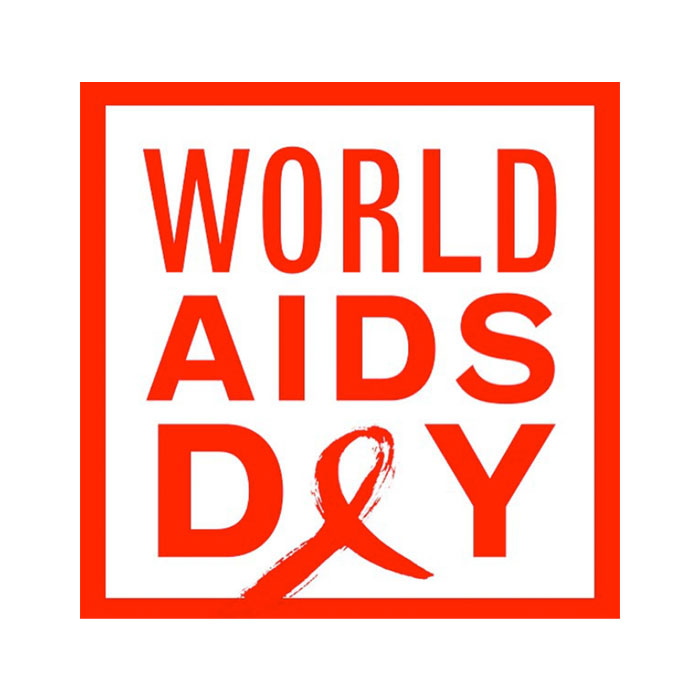 Other activities lined up for the 16 Days campaign include interfaith prayers. Most importantly, the campaign is also linked to and overlaps World Aids Day on the 1st of December.
Other activities lined up for the 16 Days campaign include interfaith prayers. Most importantly, the campaign is also linked to and overlaps World Aids Day on the 1st of December.
In 2015, the Department of Women (DoW) combined the white ribbon symbol of the campaign with the red ribbon of the HIV/AIDS campaign to demonstrate the link between Violence Against Women and HIV and AIDS.
On World AIDS Day, 1 December 2017, national and provincial departments of health will host various events across the country to share information and solicit accounts the impact of Violence Against Women and Children on the prevalence of HIV and AIDS. The Department of Justice will be launching the Sexual Offences Court in December to give this crime the specialised attention it deserves.
We therefore call on our communities to take part in activities by various departments, all in the spirit of stamping out this crime and making this country a better one for all who live in it. Let us support the activities not only on the actual days but at all times so that we free the resources dedicated to crime for other service delivery needs.
Youth’s health needs heeded
Youth’s health needs heeded JoyLocal Government
The eThekwini Municipality has responded to a call for confidential and age-appropriate health services.
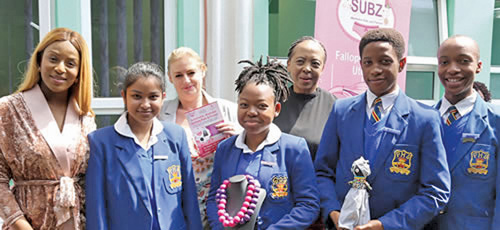 To curb the alarming rise in teenage pregnancies and illegal abortions, eThekwini Municipality recently launched an adolescent and youth-friendly service at Pinetown Clinic.
To curb the alarming rise in teenage pregnancies and illegal abortions, eThekwini Municipality recently launched an adolescent and youth-friendly service at Pinetown Clinic.
The clinic is the first health facility in the eThekwini district to comply with the adolescent and youth-friendly service standards.
Health Unit Deputy Head Dr Busi Grootboom said the launch is the municipality’s response to issues that emanated from extensive research.
“The research we conducted revealed that young people wanted a welcoming and friendly facility, where they could drop in and be quickly attended to. They insisted on their privacy and confidentiality and did not want to seek parental permission to attend.
“Young people wanted services to be offered to them at a convenient time and they wanted staff to treat them with respect and not to judge them or lecture them,” said Dr Grootboom.
Deputy chairperson of the Durban Aids Council, Siyabonga Nzimande applauded the city, saying the facility is a step in the right direction.
“We have a school here in Pinetown that recorded over 30 pregnancies last year.
“Although this number is declining, it is still worrisome. We hope that with the youth-friendly services in this clinic, these numbers will decrease drastically,” said Nzimande.
Some of the adolescent and youth-friendly services that will be offered at the clinic include HIV education, diagnosis and testing as well as treatment, care and support; contraceptive education and provision with an emphasis on dual protection method; and pregnancy testing, antenatal and postnatal care.
*Simphiwe Dlamini works for the eThekwini Municipality.
Source: www.durban.gov.za
Come park off, invites City of Joburg
Come park off, invites City of Joburg JoyLocal Government
Forget rusty swings and dusty ground, the City of Joburg has created a masterpiece of a park to get the community outdoors and active.
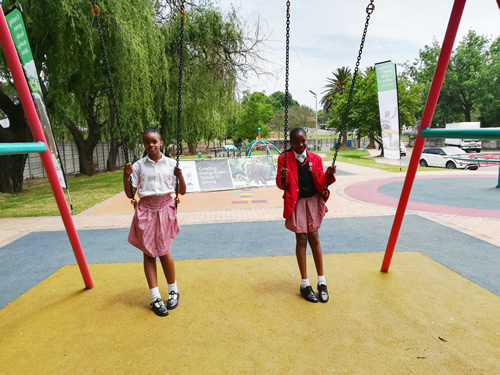 Criminals who have colonised City of Joburg parks have been warned: Residents are taking full ownership and won’t be friendly to the bad guys. At least that is according to the chairperson of the Section 79 Community Development, Councillor Meshack van Wyk.
Criminals who have colonised City of Joburg parks have been warned: Residents are taking full ownership and won’t be friendly to the bad guys. At least that is according to the chairperson of the Section 79 Community Development, Councillor Meshack van Wyk.
He was speaking at the official opening of the brand-new Short Road Park in Norwood in Region E. He invited learners and residents to take full ownership of the R2 million facility.
“This is your park. Make sure criminals are not welcome here. It’s a safe space for toddlers, learners and their parents,” said Cllr van Wyk.
Johannesburg City Parks and Zoo, responsible for creating liveable outdoor green spaces for its residents, unveiled the Short Road Park in Norwood.The Park measures about one hectare in size and forms part of the Greater Paterson Park Linear Precinct that runs close to the Louis Botha Rapid Bus Transit route.
City Parks is responsible for the maintenance of over 3 000 parks and open spaces across the City of Joburg’s seven regions.
The new recreation centre was previously a derelict and neglected space, prone to illegal dumping and graffiti and occupied by displaced people as well as invasive plant species. It has now been transformed to provide an eco-lung in the heart of the planned mixed-use residential development.
The park re-stitches the old with the new, and has retained the majestic canopy of established trees to complement the green carpet of lawn and colourful flowerbeds and playgrounds. It boasts a free-to-use outdoor gym, strategically placed solar flood lights, stormwater-harvested irrigation channels, rubberised play areas and
equipment especially designed to enhance the cognitive skills set of inquisitive and energetic toddlers.
The park will act as a catalyst to revive healthy living in Norwood. The stormwater from the main arterials leading into Norwood will be harvested and recycled to keep the park lush and green, particularly to address water scarcity in the city.
The colourful park includes benches, braai areas and picnic spots that will serve as sought-after meeting points for residents, businesses and the crèche adjacent to the facility. The project empowered work for 12 local beneficiaries during the construction phase.
Park safety is of paramount importance to City Parks and the Zoo. MMC for Community Development Cllr Nonhlanhla Sifumba also attended the launch.
"It requires communities to become closely involved in weekly activations to ensure Short Road Park is kept in a safe, clean and pristine condition and is resilient to negative external elements." She added that the transformation of this previously undeveloped space into a haven for relaxation, fun and tranquility will bring residents together and will go a long way in building social harmony, ownership and a healthy community.
Source: www.durban.gov.za
Human lives underpin crime stats
Human lives underpin crime stats Estelle GreeffThe Police Ministry is boosting efforts to ensure that the National Development Plan’s vision for a safer South Africa is realised.
 Police Minister Fikile Mbalula has vowed to deal with violent criminals. When he recently released the crime statistics for the 2016/17 financial year to the Portfolio Committee on Police, he said that murder and robbery remain stubbornly high despite a decrease over the past decade in serious community-reported crimes.
Police Minister Fikile Mbalula has vowed to deal with violent criminals. When he recently released the crime statistics for the 2016/17 financial year to the Portfolio Committee on Police, he said that murder and robbery remain stubbornly high despite a decrease over the past decade in serious community-reported crimes.
Every year, the police minister releases statistics to assess crime patterns in the country. They are also used to help strengthen crime- prevention operations.
The statistics measure 21 serious crimes. Seventeen are reported by the community and the other four are detected as a result of police-initiated operations. These include:
- possession of firearms and ammunition,
- driving under the influence of alcohol or drugs,
- dealing in drugs.
“We have no time to waste time. Crime is delivering terror and grave harm to our people and the economy,” he said.
Minister Mbalula sent a stern warning to gang lords and violent criminals, saying their exploits will be matched with a proportional response to the nature of the violence they dish out.
He said that while community-reported serious crimes continually decreased during the last half of the 10-year period under consideration (2007/08 to 2016/17), the contact crime figures dropped initially during the first half of the 10-year period, but had increased over the last three years.
Despite the 1.8 percent decrease in community-reported serious crimes, individual categories such as murder and robbery with aggravating circumstances have tended to reflect an upward trend over the past four financial years.
Minister Mbalula said the SA Police Service has entered into a partnership with Statistics South Africa to give statistics more integrity.
“We simply cannot fight against an enemy we do not understand. We get to understand the patterns, the occurrences and types of crimes through the statistics so that we may plan accordingly," he said. The integrity of crime statistics is very important and the public must trust that no clever accounting has been done.”
However the minister said figures should not only be taken as raw data as they represent “human lives and human emotions”.
“Crime involves high emotions. We must not see statistics purely as numbers. Behind the numbers are real feelings, real lives, real harm, real losses, hurt and feelings of [being unsafe].
“These statistics represent the memory of that gruesome rape or murder, the fearful home invasion. People are losing their children to heinous crimes and drug dens. Our people have no-go areas due to criminality. I acknowledge that our people live under siege from crime,” he said.
Murder on the rise
Meanwhile the police’s head of statistics, Lieutenant-General Norman Sekhukhune, said despite a decrease in community-reported crimes, murder remained a challenge.
Murder was up by 1.8 percent during the 2016/17 financial year compared to an increase of 4.9 percent in the previous year.
He said sexual offences were down by 4.3 percent when compared to 2015/16 (-3.2 percent). Attempted murder went up by 0.4 percent in the current financial year, while assault with intent to do grievous bodily harm went down by 6.7 percent. Aggravated robbery went up by 6.4 percent while assault and robbery went down by 5.2 percent and 1.3 percent respectively.
Making SA safe together
Making SA safe together Estelle GreeffPolice Minister Fikile Mbalula has urged communities to get involved in the fight against crime.
 The minister was speaking during the release of the 2016/17 crime statistics.
The minister was speaking during the release of the 2016/17 crime statistics.
He said there was a need to involve society in campaigns against substance and alcohol abuse which are among the factors behind crime. The minister urged the men and women in blue to increase policing saying more could be done to arrest crime.
“The public must be proactively involved in efforts to fight crime. Crime should be addressed by all of us as an issue of national interest and priority. We must not score political points over this issue…”
He said curbing crime is in the country’s national interest. Crime affects everyone, said the minister, citing the example of the Deputy Minister of Police, Bongani Mkongi, who could not attend the release of the crime statistics because his nephew had been stabbed to death in Khayelitsha.
Of the 2.1 million serious crimes recorded, 1.7 million were community-reported crimes, which is a drop of 1.8 percent compared to the previous financial year.
“This decrease was driven mainly by a reduction in all the broad crime categories, namely contact-related crime (-3.3 percent), contact crime (-2.4 percent), other serious crimes (-2.0 percent) and property-related crime (-0.5 percent).”
Lusikisiki's gangs in for a shock
Lusikisiki's gangs in for a shock Estelle GreeffGovernment has heard and reacted to citizens' needs.
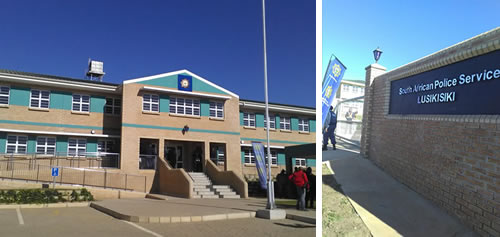 Police Minister Fikile Mbalula has opened a new police station in Lusikisiki in the Eastern Cape.
Police Minister Fikile Mbalula has opened a new police station in Lusikisiki in the Eastern Cape.
Built shortly after concerns were raised about crime levels in the area, the station will strengthen the fight against crime and enhance safety for those in and around Lusikisiki.
The town made headlines for gang-related violence, which saw President Jacob Zuma visit it to intervene through his Siyahlola campaign which monitors the delivery of state services.
During his visit, President Zuma promised the residents that government would soon be building a police station.
“We heard people’s complaints regarding crime levels. We decided to respond to that and build a police station that will ensure that services are not only efficient but are brought closer to people as well,” said Minister Mbalula.
Equipped with the latest technology, the spacious police station has received eight vehicles which should improve crime response.
“The vehicles will ensure that officers are out on the streets fighting crime and must not be used for private trips. Anyone who does that will be abusing these resources and we will not take it lying down,” warned the Minister.
Meanwhile, Acting National Commissioner Lieutenant- General Lesetja Mothiba, who was also at the opening, encouraged closer co-operation between the police and the public.
“When the police and community work together, we achieve greater results,” said Mothiba.
Law enforcers' public presence expanded
Law enforcers' public presence expanded Estelle GreeffThe Gauteng government is stepping up efforts to keep residents safe.
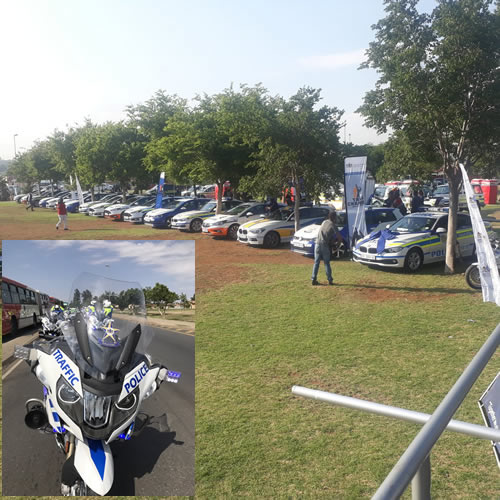 The Gauteng Local Government has handed over 200 high-performance vehicles and 75 motorbikes to law enforcement officers in Soweto. The vehicles and motorbikes are intended to fight crime and increase police visibility.
The Gauteng Local Government has handed over 200 high-performance vehicles and 75 motorbikes to law enforcement officers in Soweto. The vehicles and motorbikes are intended to fight crime and increase police visibility.
The vehicles were handed over by Gauteng Premier David Makhura, who said that the fleet will go a long way in achieving the provincial government’s target of reducing crime by 50 percent in priority police precincts. The fleet will be used by both police officers and traffic officers alike.
“We have identified 12 priority clusters and police stations in the province that contribute 50 percent of crime statistics nationally.
“Our intention is then to focus on these clusters and stations, to ensure that they reduce crime.”
Premier Makhura said special focus will also be on crimes against women and children. “I urge law enforcement agencies in our province to make life difficult for criminals. We don’t want rapists roaming around in our communities and doing as they please,” he said.
The fleet comes fitted with the latest technology, including trackers and boasts a number plate recognition system which will be able to detect if a car has been stolen or if the number plates on it belong to another car.
Johannesburg Metro Police Department Superintendent Wayne Minaar said they are hoping to have more officers out on the streets, making arrests and responding to crime scenes a lot faster.
“They [the new vehicles] will add to the existing fleet and will enhance the work of the officers. We are glad that we will be able to use them in conjunction with all the other law enforcement agencies in Gauteng,” said Minaar.
Break the cycle, speak out against abuse
Break the cycle, speak out against abuse Estelle Greeff16 Days of Activism
Violence against women and children is a violation of human rights that must be fought by all members of society.
 The 16 Days of Activism for No Violence Against Women and Children is an international awareness campaign that asks people around the world to take a stand against women and child abuse.
The 16 Days of Activism for No Violence Against Women and Children is an international awareness campaign that asks people around the world to take a stand against women and child abuse.
What is the 16 Days of Activism about?
- It is a worldwide campaign to oppose violence against women and children.
- It aims to raise awareness of the negative impact that violence and abuse have on women and children and to rid society of abuse permanently.
The success of the campaign rests on our daily individual and collective actions to safeguard our society against the cycle of abuse
When does the campaign take place?
- The 16 Days of Activism campaign is held from 25 November to 10 December every year.
What are some of the causes of violence against women and children?
It stems from the low status of women in the home and in society.
It happens when men abuse power and positions of authority in order to control women and children.
What is abuse?
Any form of behaviour that causes:
- fear
- bodily harm
- a person to do things against their will.
Examples of abuse
- Emotional abuse
- Physical abuse
- Rape
- Sexual harassment
- Child abuse
- Financial abuse
- Stalking
- Damage to property.
It may also include trespassing or entry into a person’s residence without consent.
A domestic violence case can be opened against:
- The person you are married to, whether by civil or customary rites.
- Your partner (whether of the same or opposite sex) who lives or has lived with you.
- The person you share parental responsibility with.
- People related to you by blood ties, marriage or adoption.
- The person you are engaged to, in a customary relationship, or dating.
Don’t be a victim!
- Break the cycle of violence
- Break the silence
- Know your rights
- Act against abuse
- Do not look away!
Where to get help
- SAPS Crime Stop Tel: 08600 10111
- Gender-based Violence Command Centre Tel: 0800 428 428.
- Stop Gender Violence Helpline Tel: 0800 150 150 or sms *120*7867# from any cell phone
- Family and Marriage Society of South Africa (FAMSA) Tel: 011 975 7107
- Childline Tel: 08000 55 555
- National Crisis Line Tel: 086 132 2322
- SA National Council for Child Welfare Tel: 011 339 5741
Communities must not keep quiet
Communities must not keep quiet Estelle Greeff16 Days of Activism
Violence against women and children is a violation of human rights that must be fought by all members of society.
South Africa is experiencing an increasing number of violent crimes against women and children. This is according to Major-General Tebello Mosikili, head of the Family Violence, Child Protection and Sexual Offences (FCS) unit.
The unit was re-established to focus more fully on gender-based violence.
Maj-Gen Mosikili said the tide is slowly turning, with her department working hard to fight abuse in the country.
She said more than 182 000 cases of crimes against women and children were opened since the re-establishment of her unit in 2010. Today, there are over 180 FCS units countrywide, with 2 500 dedicated detectives who have seen over 3 000 life sentences being handed down to perpetrators.
The job of being a detective within the FCS unit requires a person who is patient enough to be able to interview and extract information from victims. “These cases require time... remember this is a person whose spirit has been broken. If there is a child who has been abused, sometimes they are not sure if what happened to them is wrong or right.”
Within the FCS unit there are also forensic social workers who focus on the interface between the legal system and the human service system by means of assessments, compiling of court reports and providing expert testimonies in court.
Maj-Gen Mosikili encouraged South Africans to take a stand against abuse.
“It is my plea that each and every South African must stand up and fight this problem and ensure that South Africa is a better place to be. The community should not keep quiet when they witness abuse.
“Women and children must be protected from the home and this will carry through to the community and the entire country.”
To report abuse, neglect or exploitation, the community can contact any of the following hotlines:
- SAPS Crime Stop: 08600 10 111
- SMS Crime Line: 32211
- Department of Social Development 24-hour Command Centre: 0800 428 428 (toll-free) – callers can speak to a social worker for assistance and counselling
- Callers can also request a social worker from the Command Centre to contact them by dialling *120*7867# (free) from any cell phone
- Child Welfare South Africa: 0861 424453 / 011 452 4110 / e-mail:info@childwelfaresa.org.za.
Popular actor leads fight against intimate femicide
Popular actor leads fight against intimate femicide vuyelwan16 Days of Activism
There are many contributing factors to femicide with many women dying every year at the hands of people they know and love.
Patrick Shai, one of South Africa’s well-known actors, admits he used to physically abuse his wife.
A reformed Shai has joined hands with the Department of Justice and Constitutional Development (DOJ & CD) as an ambassador in the fight against intimate femicide.
Intimate femicide or intimate partner homicide is the killing of a woman by an intimate partner or any person who had an actual or perceived romantic, intimate or sexual relationship with the victim.
Shai beat his wife for 10 years and terrorised his children. For him, wife-beating was simply what men did.
Speaking at a recent event hosted by the DOJ & CD on raising awareness against femicide, Shai said his stepfather had done it, his uncle had done it, and so this was the way things were done.
He said he witnessed his stepfather brutally beating his mother while growing up in Meadowlands, Soweto.
“She bravely never cried out while she was being beaten. I used to believe that my stepfather did not do a good job because my mother did not scream," he said.
“So when I started to beat my wife, I would say I want to beat you so hard that you scream, that you cry louder than my mother. I still remember how my son begged me not to kill his mother,” Shai said.
After years of a toxic and bitter home life, Shai had a rude awakening when he played the role of a wife beater on the TV drama Soul City.
He was filming a domestic violence scene. “When ‘action’ was called, I saw not the set but my own house and my own family. For the first time, I saw the pain I was dishing out to my wife. For the first time, I heard the pleas of my son and I saw the pain on the face of my wife.” Shai walked off the set that day.
“I knew then that I needed to change,” he said.
When he arrived at his house later that day, he shared his experience with his wife.
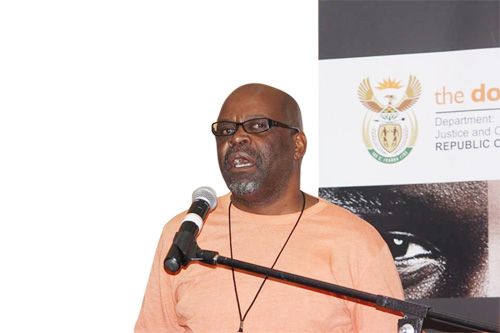 Although he appreciates the efforts made by many sectors of society to confront intimate femicide, Shai strongly believes that more needs to be done on individual fronts.
Although he appreciates the efforts made by many sectors of society to confront intimate femicide, Shai strongly believes that more needs to be done on individual fronts.
“The slogan ‘Not in my name’ is good, but even better would be ‘In your name what you are willing to do in the fight against intimate femicide?’,” he said.
Shai said witnesses of domestic abuse should never keep silent in the name of respect for the privacy of the involved parties.
“Nothing is private when violence is involved in a relationship,” he said.
His decision to publicly join the femicide fight was underpinned by the murder of 30 women and girl children in the first five months of 2017.
The majority of the victims were allegedly killed by their partners or people they knew. The DOJ & CD then took a decision to establish Femicide Watch, which will be a data bank capturing the details of all victims of femicide.
He urges women who experience domestic violence to speak out and not to “surrender to family traditions of secrecy and prioritising family unity ahead of your life”.
“I want people to understand the reason I tell my story is because I believe men can change, despite being conditioned from childhood to regard women as objects. I’m not telling my story to glamourise myself but to give people hope that if a guy like me can change, so can they.”
Shai is playing a critical role in mobilising men to prevent, support and amplify awareness campaigns against gender-based violence which often leads to femicide.
He is no stranger to active citizenry in community-based social movements. Since his rehabilitation, he has participated in movements including Brothers For Life and a men’s forum called “AmaGrootman against Women Abuse” which is a platform for men to share their stories.
Central to the programme is the need for men to equip boys for their rightful role in society, as protectors and not abusers. Shai said he disagrees with an old adage that says: “You cannot teach an old dog new tricks.” He insists that in order to curb the level of domestic violence “an old dog must be taught new tricks” to avoid a boy-child learning and repeating his father’s dark ways.
* Solomon Kganyago works for the Department of Justice and Constitutional Development
You can walk away from abuse
You can walk away from abuse vuyelwan16 Days of Activism
Gender-based violence is a disturbing phenomenon that needs to be rooted out.
 From 25 November to 10 December the country puts the spotlight on the scourge of women and child abuse in our country.
From 25 November to 10 December the country puts the spotlight on the scourge of women and child abuse in our country.
For 16 days, South Africa raises awareness about abuse and mobilises society to speak out and support our country’s most vulnerable people.
One in five South African women has experienced some form of gender-based violence, according to several reports, including the latest one by Statistics South Africa.
Sadly, most perpetrators of this crime get away unpunished as their victims suffer in silence.
Lerato Mbatha* (37) knows too well about the pain of suffering abuse at the hands of someone who once declared his undying love for her but later turned into a “monster”.
Like many victims of abuse, Mbatha, who hails from Hammanskraal, north of Tshwane, did not confide in anyone. She was too ashamed to speak to her family and also did not report the crime to the police because she says, at the time, she had no faith in the justice system.
That was more than six years ago. Today, Mbatha is among a group of activists involved in campaigns against gender-based violence that encourage the victims to stand up against their abusive partners.
As a survivor of abuse, Mbatha admits that it’s not always easy to walk away from an abusive relationship. The victims, she says, often tend to overlook their abuser’s flaws and blame themselves for making their partners angry.
In her case, when the beatings started, she couldn’t tell her parents because she was not ready to hear the truth. Her parents were against the relationship and this made her leave home and move in with her boyfriend.
As in most relationships, the first few months were “perfect”. Even though she was the only one working, she had no problem supporting her boyfriend.
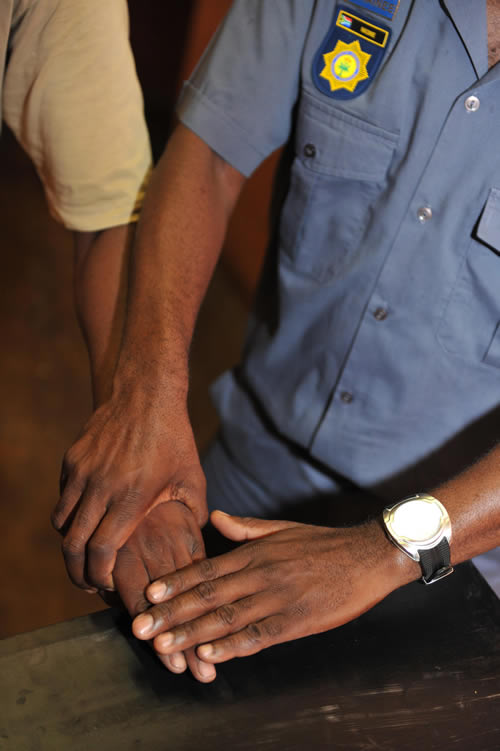 Things changed soon after she gave birth to their daughter. From then, the relationship would never be the same again.
Things changed soon after she gave birth to their daughter. From then, the relationship would never be the same again.
“He became obsessed and started accusing me of things. He would come back from drinking in the middle of the night and start shouting at me.
“He would place a gun and knife on the table and ask me to choose which weapon I prefer him to use to kill me. I would apologise for something [although] I don’t even know [what I did wrong] and beg him not to kill me. The following day, he would apologise and promise to change,” said Mbatha.
However, the beatings never stopped and no one picked up the signs of abuse because she covered the bruises on her face with makeup.
Tired of the beatings and of protecting her abuser, one day Mbatha decided enough was enough. She decided it was time to come clean about the abuse and seek help.
Mbatha subsequently decided to join the #NotInMyName initiative, an organisation that organises campaigns calling for an end to violence against women and children.
The organisation has assisted victims of abuse to get justice and also helps them to reopen cases which were not investigated. It also supports victims by accompanying them to court appearances.
The social movement has a unique approach in dealing with victims of abuse in that it assists victims of rape, drug abuse and gender-based violence by referring them to therapy to help them deal with their ordeal. The organisation also works with boys in a bid to prevent and end the problem of abuse.
In May this year, hundreds of people took part in the #NotInMyName march against women abuse. The march to the Union Buildings came in the wake of rolling reports of rape, murder and other gender-based violence in the country. Thanks to the holistic help she received from the #NotInMyName initiative, Mbatha is now able to spend time raising her three daughters and fighting for justice for the victims of gender-based violence.
She feels that anti-abuse campaigns should also target young boys who are affected by abuse because they often become abusive themselves.
As South Africa observes 16 Days of Activism against Women and Children, victims should draw strength from Mbatha’s story and speak out and seek help.
While Mbatha was able to break the cycle of violence, many others are not as fortunate and could end up paying the ultimate price.
*The victimís name was changed in this article at her request.
Able entrepreneurs despite disability
Able entrepreneurs despite disability vuyelwanDisability Month
A host of services are available to level the playing field for entrepreneurs with disabilities.
Disabled entrepreneurs from KwaZulu-Natal forgot about their disability for a while and shared ideas that can move their businesses to another level at the Disability Engagement Session held in Pinetown recently.
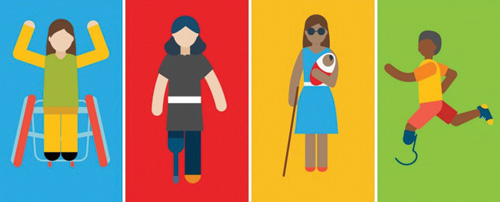 More than 200 disabled people gathered at the event, hosted by the Department of Small Business Development in collaboration with various stakeholders. The primary focus of the two-day workshop was to outline services available to entrepreneurs living with disability. The entrepreneurs were given a chance to talk about challenges experienced in accessing services so that they can be addressed by the authorities.
More than 200 disabled people gathered at the event, hosted by the Department of Small Business Development in collaboration with various stakeholders. The primary focus of the two-day workshop was to outline services available to entrepreneurs living with disability. The entrepreneurs were given a chance to talk about challenges experienced in accessing services so that they can be addressed by the authorities.
Department of Small Business Development Spokesperson Cornelius Monama said, “We believe that disabled people can contribute massively to the economy of this country if given support and information about services available to them. Living with disability does not mean that you cannot be a successful business owner. There are plenty of resources available to level any disadvantages disabled individuals may have," he said.
“What we are communicating to them is that regardless of disability, it’s important to develop a tangible business plan and have a marketing and growth strategy before you begin your endeavour,” said Monama.
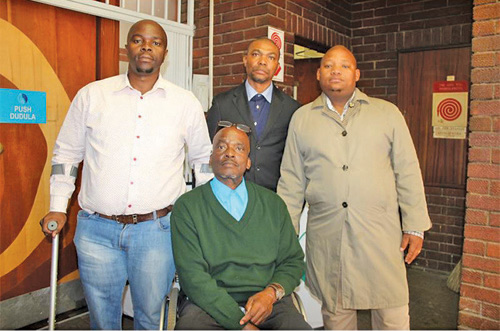 Monama said the second day of the workshop provided an opportunity for entrepreneurs with disability to participate in a ‘Pitch session’ to talk about their enterprises as well as priority interventions needed to take them to the next level.
Monama said the second day of the workshop provided an opportunity for entrepreneurs with disability to participate in a ‘Pitch session’ to talk about their enterprises as well as priority interventions needed to take them to the next level.
Following each pitch, government stakeholders their committed to do whatever they could to help the entrepreneur overcome their challenge through available support services.
One of the entrepreneurs, Mduduzi Jijana, said that they were grateful for the opportunity to grow their business.
“People have a perception that we, as disabled people, need grants to survive, but all we need is the government to provide us with support to build ourselves," he said. "The most common challenge that we experience as disabled entrepreneurs is that people in the business sector have less trust in us. If we apply for funding from big companies, we are turned down because they do not think we will be able to repay them. We are glad that government can help us with funding,” he said.
Caregivers benefit from government TLC
Caregivers benefit from government TLC vuyelwanKwaZulu-Natal Department of Health has empowered nearly 200 caregivers through a training programme to enable them to join the formal economy as salaried workers.entrepreneurs with disabilities.
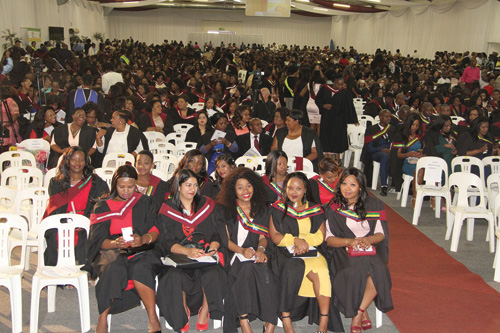 For years she was a community caregiver but thanks to a government training programme, Busisiwe Mbambo is now a newly qualified nurse.
For years she was a community caregiver but thanks to a government training programme, Busisiwe Mbambo is now a newly qualified nurse.
“I have served for six years as a community caregiver,
earning stipends. I’m glad I persevered. If I gave up along the way, I would not be here today. As a nurse, I am now able to provide for my family and give my children a quality education. We are very grateful to the KZN Department of Health for investing in us and giving us an opportunity,” said a teary Mbambo during her graduation ceremony.
Mbambo and 178 other caregivers who were selected for upskilling were among 1 461 nurses from various KZN nursing colleges who graduated in October.
The nurses were trained to address the shortage of scare skills in the health sector, including advanced midwifery, orthopedics nursing science, operating theatre technique, critical care nursing, child care nursing science, ophthalmic nursing and psychiatric nursing.
Speaking at the graduation ceremony, KZN MEC for Health Dr Sibongiseni Dhlomo said nurses play an important role in improving the lives of people in the province.
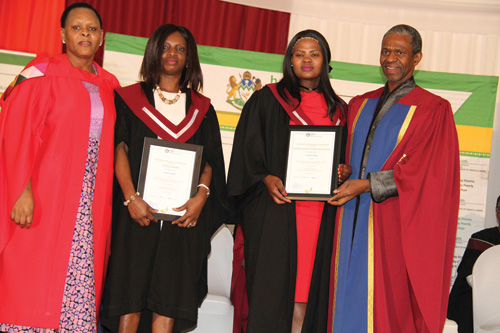 He said without the commitment and hard work of nurses, KZN would not have managed to enroll more than 1.3 million people on anti-retroviral
He said without the commitment and hard work of nurses, KZN would not have managed to enroll more than 1.3 million people on anti-retroviral
therapy nor accelerated the prevention of mother to child transmission of HIV from 20 percent in 2008 (which amounted to 800 000 mothers countrywide passing HIV onto their newborn children each year) to the current 1.2 percent.
MEC Dhlomo urged all nurses in the province to go back to basics and always uphold the Nurses Pledge when dealing with
patients and the public at large.
"There are nurses in the community who spoil the name of the profession. As nurses, it is not good enough to have a good attitude from morning until lunchtime and then change, and become something else,” he said.
Unite against child abuse
Unite against child abuse vuyelwanEach member of society has a role to play in protecting children from abuse and neglect.
Children deserve society’s utmost protection from sexual predators.
Thandiwe Maseko, a social worker at the Greater Rape Intervention Programme (GRIP), is at the forefront of the fight for victims’ rights stressed that it is important for parents to be attentive to signs that their children may have been sexually abused. “Report suspicions as soon as possible to the authorities,” she urged.
“Know your children. Sometimes children act strangely and as their parents, you will be the first one to notice if something is off. Be sure to talk to them about the dangers of abuse and encourage them not to talk to strangers. Call a spade a spade," she said. “Tell your children that if someone touches you ‘here, run and come tell me’. In this day and age, we cannot hide such things from children.”
A 16-year-old took two years to work up the courage to tell her family that her uncle had raped her. Her fears were grounded because she says no one believed her. Ever since, she has been living in fear and is reminded of the incident every time she sees her uncle.
“I don’t think I will ever trust any man in my life. I see my uncle living a normal life whilst I’m drowning in depression. When I finally talked about the rape, I thought at least one person would believe me but they believe my uncle. Sometimes I feel like I am alone because in this world, nobody cares,” she added.
She says her family advised her not to open a case since it would tear the family apart.
Mpumalanga police spokesperson Sergeant Gerald Sedibe, said this is the wrong approach. He encouraged community members to report cases of abuse and rape at their nearest police station.
“We do not condone abuse in our community, whether the perpetrator is a family member or a complete stranger. You are all encouraged to report it. We must work together to end abuse in our homes and communities by doing the right thing,” he said.
Maseko confirmed that it is a big challenge for victims to speak up and report their abuse. This puts their lives at risk because abuse can quickly spiral out of control.
“We still have a lot of work to do in our communities before women and children will feel confident enough to report domestic and child abuse. Most of our women are afraid to open cases and would rather stay in an abusive relationship than admit to what is going on and seek assistance. "This is because of the sense of fear their abusers have instilled in them.”
The 16 Days of Activism for No Violence Against Women and Children provides an important platform for GRIP to intensify its ongoing awareness efforts. Maseko said the organisation has embarked on various door-to-door campaigns to create awareness around sexual abuse and to offer their services.
“At least they are aware of what we do and can call upon us should they need our help,” she said.
GRIP assists victims of sexual abuse with counselling, acquiring transferable skills and, if they have suitable qualifications, to seek employment. Altogether the Intervention Programme has 23 care rooms across Mpumalanga – 18 at police stations and five at hospitals.
GRIP ís counselling and information line - 083 310 1321
Better healthcare for Gcilima residents
Better healthcare for Gcilima residents vuyelwanThe opening of a clinic on the South Coast will relieve queues at existing healthcare facilities and bring services closer to the people.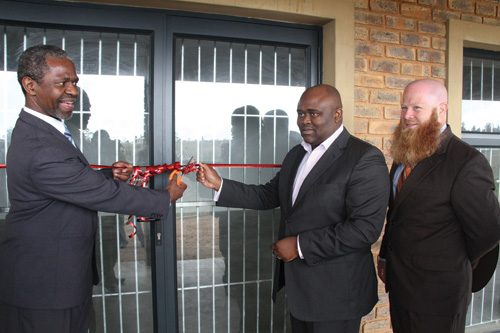
Primary healthcare services in the rural village of Gcilima, on the South Coast of KwaZulu-Natal, have been given a boost thanks to the opening of a state-of-the-art clinic that will offer better services than the existing mobile clinic.
The R3-million Khanyisizwe facility has brought relief to more than 8 000 residents who previously received treatment from a mobile clinic or at a clinic 10 km away. Community member Babhekile Cele said if she missed the mobile clinic date, she had to walk more than 10 km to collect her medication at Thembalesizwe.
“This clinic is going to help us a lot. We are very grateful for it,” she said.
The facility is a donation from Greg Evans, of First Love Ministries, which also supports various local community projects in the area.
Speaking at the handover, Health MEC Sibongiseni Dhlomo thanked Chief Thobigunya Xolo for approaching First Love Ministries and asking them to build the facility for his people.
“Today we can safely declare that the people of this area are going to be healthier and live longer because they have a health facility that will be providing preventative and promotive health services, a pick-up point for chronic medication, Phila Mntwana child wellness services and a base for the performing of Operational Sukuma Sakhe activities,” he said.
He urged healthcare professionals to always treat patients with care and compassion.
“The healthcare profession is unlike others. If a teacher does not do his or her job, children will fail. But those children will come back next year. But if a nurse is busy on Whatsapp on her phone instead of taking care of a patient, that patient will die and be buried.”
Chief Xolo thanked First Love Ministries and the provincial Department of Health for transforming the health services within the community.
SA gets wheat wise
SA gets wheat wise lebangGovernment has invested in a multi-consortium wheat breeding programme that will improve the country’s wheat yields.
 A partnership between government and the wheat production sector is set to improve wheat yields, despite the challenging climate.
A partnership between government and the wheat production sector is set to improve wheat yields, despite the challenging climate.
The multi-million rand Wheat Breeding Platform at Welgevallen Experimental Farm in Stellenbosch in the Western Cape should help South Africa not only meet the current local wheat demand but also become a wheat exporter.
The firm was established in 2014 as a consortium comprising public and private sector partners.
The department’s involvement was to provide support through relevant programmes to fund research and development in identified focus areas.
The department has invested R15 million in a multi-consortium wheat breeding programme with the aim of improving abiotic stresses such as drought and extreme temperatures.
The platform is a partnership between the department, Grain SA, the Department of Agriculture, Forestry and Fisheries, the Agricultural Research Council, Sensako, Pannar and Stellenbosch University, among others.
Science and Technology Minister Naledi Pandor said the development was government and the private sector’s response to the challenges the industry faced. These include:
- low production levels
- competitiveness
- rising demand for wheat.
“It is very important that we work with researchers to support and enhance our agricultural productivity by producing products that will respond to the particular conditions in which we do agriculture in South Africa and on the African continent.”
She said government will pay particular attention to seed products that will help the country increase exports and reduce imports, most specifically of maize and wheat.
“We import over 46 percent of our wheat. If we can improve the quality and have a larger product coming out of seeds that we produce innovatively in South Africa, that would be excellent,” she said.
Wheat is the second most important grain crop produced in South Africa and plays an important role in national food security.
With the Western Cape recently being hit by drought conditions that are threatening food safety, the initiative is expected to assist farmers to cope with crop demands.
EPWP workers pocket more
EPWP workers pocket more lebangParticipants in one of government’s most successful work programmes will get a pre-Christmas inflation-related increase.
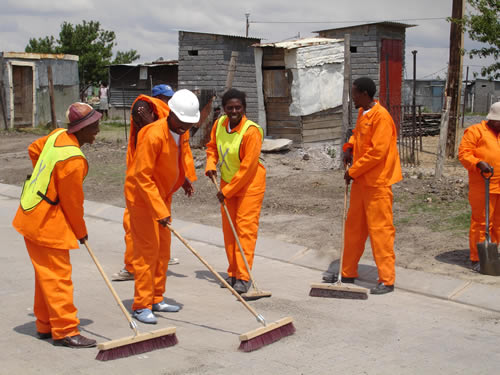 The minimum wage for all Expanded Public Works Programme (EPWP) participants increased from R83.59 to R88.00 per day or per task, with effect from 1 November.
The minimum wage for all Expanded Public Works Programme (EPWP) participants increased from R83.59 to R88.00 per day or per task, with effect from 1 November.
The Department of Public Works’ deputy-director general for the EPWP, Stanley Henderson announced.
The wage increase is in line with the current inflation rate.
“The EPWP continues to play a significant role in uplifting the lives of EPWP participants and communities through the creation of work opportunities and providing much-needed services under the EPWP sectors."
The sectors include infrastructure, non-state, environment, culture and the social.
“The wage increase will significantly boost the socio-economic conditions of the EPWP participants, and I urge all the implementing bodies of the EPWP to timeously adhere to the implementation of the approved prescribed minimum wage increase as of 1 November 2017,” said Henderson.
The implementation of the adjusted minimum wage applies to all the participants of the EPWP across all sectors. However, many public bodies implementing the EPWP projects pay wages that are much higher than the prescribed minimum wage, which is a significant move towards achieving better socio-economic status of the participants and communities.
The EPWP is a government initiative aimed at reducing poverty and unemployment by providing training and short to medium-term labour intensive work opportunities to poor and unemployed South Africans.
Participants work in different projects such as early childhood development centres, home community-based care, extra school support programmes, Working on Fire, Working for Water and road maintenance projects.
The skills participants gain and the training they receive gives them a better chance to enter the formal job market or become entrepreneurs.
Jobs: Compensation Fund
Jobs: Compensation Fund vuyelwanChief Operations Officer
Centre: Compensation Fund, Pretoria
Reference No: HR 5/1/2/3/47
Salary: Commencing: R 1 127 334 –1 347 879 per annum (SR 14)
Enquiries: Mr V Mafata (012) 319 9495
Requirements: An NQF level 7 qualification (as recognized by SAQA) in Finance, ICT or Business related Degree ● Minimum of 5 years’ experience on strategic management, monitoring, evaluation of organizational performance, Information Communication Technology services and customer care at senior management level. Knowledge: Public Service Regulations (PSR) ● Public Service Act (PSA) ● Project Management principles and methodologies.● Project management information technologies e. g PMBOK, MS projects ● Application of research methodology ● Customer Service (Batho pele Principles). ● Quality Management principles and processes Legislative Requirements: Public Finance Management Act (PFMA) ● Treasury Regulations ● Monitoring and Evaluation frameworks Skills: Strategic Thinker. ● Visionary ● Resilience and Decisiveness ● Flexibility ● Persuasive communicator. ● Creativity ● Disciplined / Focused. ● Assertive ● Optimist ● Responsible ● Determined. ● Sensitive and Supportive ● Committed. ● Driving
Duties: Develop and manage the strategic and operational planning framework to provide impetus to the strategic intent of the fund. ● Develop and manage the organizational performance management framework aimed at assessing the performance of business units against the strategic plan of the fund ● Provide strategic direction on the Customer Care services and Service Delivery, improvement initiatives.● Manage and oversee Information Communication Technology services of the Fund. ● Manage the overall Chief Directorate.
Chief Director: Medical Services
Centre: Compensation Fund, Pretoria
Reference No: HR 5/1/2/3/48
Salary: Commencing: R 1 127 334 – 1347 879 per annum (SR 14)
Enquiries: Mr V Mafata (012) 319 9495
Requirements: An MBCHB Degree ● Diploma in Occupational Health will be an added advantage ● Minimum of 5 years’ appropriate on SMS –Director level (MBCHB/ Degree) in Medical processing environment ● Registration with HPCSA Knowledge: Public Service, Department of labour and Compensation Fund business strategies and goals ● Directorate goals and performance requirements ● Compensation Fund Services ● Compensation Fund Value Chain and business processes ● Public Service, Department of labour and Compensation Fund regulations, policies and procedures ● Relevant stakeholders ● Customer Service principles (Batho Pele Principles) ● Fund values ● Required Information technology knowledge ● DPSA guidelines on COIDA ● Technical Knowledge Legislative Requirements:. COIDA Act, Regulations and Policies ● Public Service Act ● Occupational Health and Safety Act (OHS) ●PFMA and National Treasury Regulations ● Promotion of Access to Information Act ● PAJA ● Constitution Act 108 of 1996 (amended) ● General knowledge of the Public service regulations Skills: Strategic Capability and Leadership ● Programme and Project Management ● Financial Management ● Change Management ● Knowledge Management ● Service Delivery Innovation (SDI) ● Problem Solving and Analyses ● People Management and Empowerment ● Client Orientation and Customer Focus ● Communication ● Driving
Duties: Provide research and best practice standards regarding medical services to support the Funds compensation services ● Oversee the Adjudication of medical claims and processing of medical accounts ● Establish and maintain high-level relationship with various internal and external stakeholders ● Manage the operations of the Chief Directorate and resources (Human, Finance, Equipment, Asset) in the Chief Directorate
Chief Director: Orthotic, Labour Activation Programme (LAP) and Rehabilitation
Centre: Compensation Fund, Pretoria
Reference No: HR 5/1/2/3/49
Salary: Commencing: R 1 127 334 – 1 347 879 per annum (SR 14)
Enquiries: Mr V Mafata Tel: (012) 319 9495
Requirements: A Degree in Orthotics and Prosthetics/ Occupational Therapy/ MBCHB or relevant clinical rehabilitation qualification at NQF level 7 ● Post Graduate Diploma in Occupational Health will be an added advantage ● 5 years’ experience at Senior Management Level or Director level on orthotics and prosthetics/ Occupational Therapy and Rehabilitation environment ● Registration with HPCSA Knowledge: Department of Labour (DoL) and Compensation Fund business strategies and goals ● Public Service Act ● Public Service Regulations ● Required IT Knowledge ● Technical Knowledge ●Occupational Health and Safety Act (OHS) ● PFMA and National Treasury Regulations ● Promotion of Access to Information Act Legislative Requirements:. COIDA Act ● National Health Act ● Allied Health Profession Act ● Rehabilitation Framework ● Integrated National Disability Strategy ● Promotion of Equity and Prevention of unfair Discrimination Act Skills: Strategic Capability and Leadership ● Programme and Project Management ● Rehabilitation. ● Financial Management ● Change Management ● Knowledge Management ● Service Delivery Innovation (SDI) ● Problem Solving and Analysis ● People Management and Empowerment ● Client Orientation and Customer Focus ● Communication ● Driving
Duties: Provide strategic leadership and guidance on the implementation of the Labour Activation Programmes ● Provide Direction on the Management of prosthetic and orthotic services ● Oversee the development, implement and monitor Rehabilitation and Re-Integration programme for injured employees and advise the Fund on all matters pertaining to the rehabilitation of injured employees ● Establish and maintain high-level relationship with various internal and external stakeholders ● Manage the operations of the Chief Directorate and resources (Human, Finance, Equipment, Asset) in the Chief Directorate.
Director: Executive Support
Centre: Compensation Fund, Pretoria
Reference No: HR 5/1/2/3/40
Salary: Commencing: R948174 - R 1116918 per annum (SR13)
Enquiries: Mr V Mafata (012) 319 9495
Requirements: An NQF level 7 qualification (as recognized by SAQA) in Project Management or Public Management or Public Administration or Business related ● A Minimum of 5 years working experience at MMS level Knowledge: Departmental policies and procedures ● Public Service Regulations (PSR) ● Public Service Act (PSA) ● Labour Relation Act ● Employment Equity Act ● Project management principles and methodologies ● Project management information technologies e.g. PMBOK, MS projects etc. Legislative requirements: COIDA ● Recent King report ● Batho-pele principles Skills: ● Computer literacy ● Change management ●People development and empowerment ● Strategic management and leadership ● Financial management ● Project management ● Communication ● Report Writing ● Presentation ● Interpersonal relations
Duties: Provide a strategic project coordination service within the Compensation Fund ● Review and update the Commissioner’s Client Relationship Management Strategy for the Fund ● Provide corporate secretariat support to the Board of the Fund and the executive committees meetings ● Develop and ensure the implementation of administrative measure for the efficient operation of the Commissioner ● Manage the overall strategic planning, policy, projects, monitoring and evaluation Directorate
Director: Employer Services
Centre: Compensation Fund, Pretoria
Reference No: HR 5/1/2/3/43
Salary: Commencing: R948174 - R 1116918 per annum (SR13)
Enquiries: Ms ME Ruiters (012) 319 9378
Requirements: An NQF level 7 qualification (as recognized by SAQA) in Accounting, Finance or Business Administration ● 5 to 8 years relevant experience in underwriting group insurance or employer registration and assessment/revenue raising area at MMS level Knowledge: Department of Labour and Compensation Fund business strategies and goals ● Directorate goals and performance requirements ● Relevant stakeholders ● Customer Service (Batho Pele Principles) ● Fund IT Operating Systems ● DPSA guidelines on COIDA ● Extensive knowledge and understanding of Treasury Audits ● Risk management and audit practices ● Extensive financial management and international financial regulatory standards ● Understanding of public sector revenue collection processes ● Extensive knowledge of internal controls and auditing principles. Legislative requirements: Compensation for occupational Injuries and diseases Act (COIDA) ● Public service regulations Act ● Public service regulations ● Public finance Management Act (PFMA) ● Promotion of Access to Information Act ● Constitution Act 108 of 1996 (amended) ● Road Accident Fund (RAF) ● LRA , EE Act, SDA & BCEA Skills: Strategic leadership and capability ● Client orientation and customer focus ●Service delivery Innovation ●Programme and project management ● Analytical thinking ● Planning and organising ● Communications skills (verbal and written) ● Knowledge management ● Financial Management ● Change Management ●Problem solving and analysis ● Decision Making ● Accountability ●People management and empowerment (including developing others) ● Risk Management and Corporate Governance
Duties: Monitor the registration of employers in accordance with the COID Act ● Monitor and evaluate employer’s compliance with COIDA, on employers’ registration and assessment ● Manage billing and administration as well as employers assessment ● Manage the operations Directorate ● Manage resources within the Directorate.
Director: Information and Communication Technology
Centre: Compensation Fund, Pretoria
Reference No: HR 5/1/2/3/41
Salary: Commencing: R948174 - R 1116918 per annum (SR13)
Enquiries: Ms NC Qamata (012) 319 9212
Requirements: An NQF level 7 as recognized by SAQA (tertiary qualification) in Information Technology or Equivalent qualifications ● A minimum of 5 years working experience in ICT environment at MMS level Knowledge: Public Financial Management Act (PFMA) ● Public Service Regulation (PSR) ● Public Service Act (PSA) ● State Information Technology Agency Processes (SITA) ● Information Technology ● Infrastructure and Network Architecture Designs ● Electronic Document Management System Legislative requirements: Access to information Act) ● Minimum Information Security Standard (MISS) ● Electronic Communication Transaction Act Skills: ● Problem Solving ● People Management ● Strategic Management ● Presentation ● Planning and Organizing● Analytical ● Communication Skills (Written and Verbal) ● Ability to influence ● Computer Literacy ● Report Writing ● Project Management
Duties: Provide leadership and develop strategies with regards to ICT operations (Infrastructure and Applications) within the Fund ● Oversee overall delivery of projects (planning, coordination and execution) in the Fund ● Manage knowledge and information management in order to provide a strategic information service and efficient corporate knowledge management system ● Manage the resources with in the Directorate.
Director: Labour Activation Programmes
Centre: Compensation Fund, Pretoria
Reference No: HR 5/1/2/3/42
Salary: Commencing: R948174 - R 1116918 per annum (SR13)
Enquiries: Mr V Mafata (012) 319 9495
Requirements: An NQF level 7 qualification (as recognized by SAQA) in Public Management or Business Administration or Training and Development related ● A Minimum of 5 years experience in a similar field at MMS level Knowledge: Public Financial Management Act (PFMA) ● Public Service Regulations (PSR) ● Public Service Act (PSA) ● Labour Relations Act (LRA) ● Basic Guide to Private Employment Agencies ● Basic Condition of Employment Act (BCEA) ● Promotion of Access to Information Act (PAIA). Legislative requirements: COID Act ● Skill Development Levies Act ● Manpower Training Act Skills: Research and development ● Computer literacy ● Policy formulation ● Change management ● People development and empowerment ● Strategic management and leadership ● Financial management ● Programme and Project management ● Knowledge Management
Duties: Develop Strategies and Policies to guide the monitoring of Active Labour Programmes Funding and provide direction on the implementation thereof ● Coordinate and maintain relations with relevant stakeholders of the Fund involved in labour issues ● Develop and manage systems to monitor the impact of the Active Labour Programmes ● Consolidate reports from all relevant stakeholders and advice the CF Board regarding the performance of Institutions being funded ● Manage all the Resources within the Directorate
Director: Treasury, Investment and Actuarial Services
Centre: Compensation Fund, Pretoria
Reference No: HR 5/1/2/3/44
Salary: Commencing: R948174 - R 1116918 per annum (SR13)
Enquiries: Ms ME Ruiters (012) 319 9378
Requirements: An NQF level 7 qualification ( as recognized by SAQA ) in Actuarial or Investment Management or Finance or Accounting ● CFA/ CA (SA) Professional Qualification will be advantageous ● A Minimum of 5 years working experience in Investment Management or Actuarial Management at MMS level Knowledge: Public Service Regulations (PSR) ● Public Financial Management Act (PFMA) ● Public Service Act (PSA) ● Labour Relation Act ● Batho Pele Principles ● All Labour Legislations ● Current Institutional Investment Practices, Processes and Theories ● Current literature and research on the field ● Generally Accepted Accounting Practices (GAAP) ● International financial reporting standards ● General Recognised Accounting Practices (GRAP) ● Labour Relations Act ● Basic Conditions of Employment Act. Legislative requirements ● COID Act ● Public Finance Management Act (PFMA) ● National Treasury Regulation Skills: Complex financial analysis ● Budgeting and financial management ● Business writing skill ●Computer literacy ●Applied strategic management ● communication and information management ● change management ● Continuous improvement ● Customer focus and responsiveness ● People and performance management ● Conflict Management ● Project or programme management ● Risk management and Fund Governance.
Duties: Direct the treasury and investments in the CF ● Provide strategic guidance on treasury services ● Provide oversight of the outsourced actuarial services ● Oversee the operational processes of the treasury, investment and actuarial services ● Manage resources (human, financial, equipment/assets) of the Directorate
Director: Medical Claims
Centre: Compensation Fund, Pretoria
Reference No: HR 5/1/2/3/45
Salary: Commencing: R948174 - R 1116918 per annum (SR13)
Enquiries: Mr V Mafata 012 319 9495
Requirements: An NQF level 7 qualification (as recognized by SAQA ) in Occupational Nursing or Healthcare Related ● Qualification in Occupational Health HPCSA coding certificate will be an added advantage● A Minimum of 5 years working experience at MMS level ● Registration with the HPCSA/SANC Knowledge: DoL and Compensation Fund business strategies and goals ● Directorate goals and performance requirements ● Compensation Fund Value Chain and business processes ● Public Service Regulations ● Medical Terminology ● COIDA tariffs ● Relevant stakeholders ● Customer service (Batho Pele Principles) ● Fund IT Operating Systems ● DPSA guidelines on COIDA ● Technical knowledge. Legislative requirements ● COID Act ● Medical Regulations ● Nursing Regulations ● Occupational Health and Safety Act (OHS) ● PFMA and National Treasury Regulations Skills: ● Computer literacy ● Change management ●People development and empowerment ● Strategic management and leadership ● Financial management ● Interpersonal ● Problem solving and strong analysis ● Strong Report Writing
Duties: Monitor and manage medical claims and set controls for invoices payment ● Monitor the implementation of the medical tariffs for clinical coding and billing ● Establish and maintain good relations with relations with Medical Service Providers/Association/Stakeholders ● Lead the development/review and implementation of medical claims policies and procedures ● Manage the operations and resources (Human Finance, Equipment, Assets) of the Directorate.
Director: Orthotics and Prosthetics
Centre: Compensation Fund, Pretoria
Reference No: HR 5/1/2/3/46
Salary: Commencing: R948174 - R 1116918 per annum (SR13)
Enquiries: Mr V Mafata (012) 319 9495
Requirements: An NQF level 7 Degree/ National Diploma (as recognized by SAQA) in orthotics and prosthetics/ Occupational Therapy ● Post Graduate Diploma in Occupational Health/ Occupational Therapy / Occupational Therapy Management will be an added advantage ● 5 years experience on Management level/ Deputy Director level on orthotics and prosthetics environment Knowledge: Relevant stakeholders ● Compensation Fund services ● Customer Service (Batho Pele Principles) ● Fund values ● Required Information technology knowledge ● Fund IT Operating Systems ● DPSA guidelines on COIDA ● Technical Knowledge ● General knowledge of Public Service Regulations Legislative Requirements:. Public Service Act ● Basic Conditions of Employment Act ● Employment Equity Act ● Occupational Health and Safety Act (OHS) ●PFMA and National Treasury Regulations ● Promotion of Access to Information Act Skills: Required Technical Proficiency ●Business Writing Skills ● Required IT Skills ● Fund IT Operating Systems ● Programme and Project Management ● Financial Management ● Service Delivery Innovation (SDI) ● Planning and Organizing ● Problem Solving and Analyses ● Communication ● Work Ethic and Self management ● Risk Management and Corporate Governance ● Medical Skills ● Environmental Awareness
Duties: Develop and design prosthetic and orthotic policy, strategy and processes for the benefit of COIDA patients ● Develop and design prosthetic and orthotic regulations for the benefit of COIDA patients ● Manage, establish and maintain relationships and protocols with orthotics and prosthetics institution across the country ● Manage, implement and monitor prosthetics devices ● manage the operations of the Directorate and resources (Human, Finance and Equipment)
Audit Committee member
Centre: Compensation Fund, Pretoria
Reference No: HR 5/1/2/3/37
Salary: Members will be remunerated according to rates approved by the Department
Enquiries: Ms B Gumbu (012) 319 9320
Requirements: A relevant three-year tertiary or equivalent Legal qualification for appointment as a member of the Audit Committee of the Compensation Fund for a period of three years. Applicants must have exposure in labour, insurance, legal, auditing, finance and extensive experience in Corporate Law within the public sector and Legal Compliance. The applicants should be independent and knowledgeable on the status of their positions as member of the Audit Committee. A knowledgeable person who keeps up to date with the development of Corporate Law and Legal Compliance profession and developmental aspects, member of a recognised body, a person who has Government interest in delivering a better service to its citizens. Candidates should have executive management experience corporate law and legal compliance for more than ten years. Exposure in serving in the oversight committees will be an advantage.
Duties: Fulfil oversight responsibilities with regard to governance, Information Technology governance, risk management, internal controls, legal compliance, external and internal audit, management accounts and annual financial statements. Assist the Accounting Officer/Authority in the effective execution of his/her responsibilities. Help build trust and confidence in how the fund is managed. Regulate and discharge all the responsibilities as contained in the Audit Committee Charter. Competencies and attributes: Analytical thinking ability and good communication skills. Courage to challenge answers and ask relevant questions, willing to dedicate time and energy to serve the interest of the public, encourage openness and transparency, healthy scepticism and professional approach, high level of integrity, inquisitiveness and independent judgement, knowledge of the public sector fund’s risk and control, offer new perspective.
Medical Officer: Rehabilitation (Grade 2)
Centre: Compensation Fund, Pretoria
Reference No: HR 5/1/2/3/38
Salary: Commencing: R 842028 – 920703 per annum (OSD)
Enquiries: Dr LO Mosidi (012) 319 9378
Requirements: An MBCHB Degree ● DOH (Diploma in Occupational Health) will be an added advantage ● Minimum 5 years appropriate experience after registration with HPCSA as a Medical Practitioner ● Post-MBCHB clinical application in a disability setting ● Post incumbent may be required to travel to see patients and clients Knowledge: Public Service, Department of labour and Compensation Fund business strategies and goals ● Directorate goals and performance requirements ● Compensation Fund Services ● Compensation Fund Value Chain and business processes ● Public Service, Department of labour and Compensation Fund regulations, policies and procedures ● Relevant stakeholders ● Customer Service principles (Batho Pele Principles) ● Fund values ● Required Information technology knowledge ● Compensation Fund Information technology operating systems ● DPSA guidelines on COIDA ● Technical Knowledge Legislative Requirements: COIDA Act, Regulations and Policies ● Public Service Act ● Occupational Health and Safety Act (OHS) ●PFMA and National Treasury Regulations ● Promotion of Access to Information Act ● PAJA ● Constitution Act 108 of 1996 (amended) ● General knowledge of the Public service regulations Skills: Required Technical Proficiency ● Business Writing Skills● Required IT Skills ● Fund IT Operating Systems ● Strategic Leadership ● Programme and Project Management ● Financial Management ● Change Management ● Knowledge Management ●Service Delivery Innovation (SDI) ● Planning and Organising ● Problem solving and analysis ● Decision Making ● Accountability ● People Management and Empowerment (including developing others) ● Client orientation and customer focus ● Communication ● Work Ethic and self management ● Risk management and Corporate Governance ● Medical Skills ● Environmental Awareness
Duties: Assist in the designing and implementation of rehabilitation and integration programme ● Assist in the management of stakeholder concerns, interests, and questions as they relate to the adjudication process
Principal Medical Officer: Rehabilitation (Grade 3)
Centre: Compensation Fund, Pretoria
Reference No: HR 5/1/2/3/39
Salary: Commencing: R977199.00 – R1221723.00. per annum (OSD)
Enquiries: Dr LO Mosidi (012) 319 9378
Requirements: An MBCHB Degree ● DOH (Diploma in Occupational Health) will be an added advantage ● Minimum 10 years appropriate experience after registration with HPCSA ● Post incumbent may be required to travel to see patients and clients Knowledge: Public Service, Department of labour and Compensation Fund business strategies and goals ● Directorate goals and performance requirements ● Compensation Fund Services ● Compensation Fund Value Chain and business processes ● Public Service, Department of labour and Compensation Fund regulations, policies and procedures ● Relevant stakeholders ● Customer Service principles (Batho Pele Principles) ● Fund values ● Required Information technology knowledge ● Compensation Fund Information technology operating systems ● DPSA guidelines on COIDA ● Technical Knowledge Legislative Requirements: COIDA Act, Regulations and Policies ● Public Service Act ● Occupational Health and Safety Act (OHS) ● PFMA and National Treasury Regulations ● Promotion of Access to Information Act ● PAJA● Constitution Act 108 of 1996 (amended) ● General knowledge of the Public service regulations ● Skills: Required Technical Proficiency ● Business Writing Skills● Required IT Skills ● Fund IT Operating Systems ● Strategic Leadership ● Programme and Project Management ● Financial Management ● Change Management ● Knowledge Management ● Service Delivery Innovation (SDI) ● Planning and Organising ● Problem solving and analysis ● Decision Making ● Accountability ● People Management and Empowerment (including developing others) ● Client orientation and customer focus ● Communication ● Work Ethic and self management ● Risk management and Corporate Governance ● Medical Skills ● Environmental Awareness ● Environmental Awareness
Duties: Design and implement rehabilitation and integration programme ●Manage stakeholder concerns, interests, and questions as they relate to the adjudication process ● Manage the sub-directorate.
Closing date for applications: 20 November 2017 at 16:00
Applications must be submitted on form Z83, obtainable from any Public Service Department or on the internet at www.gov.za/documents. The fully completed and signed form Z83 should be accompanied by a recently updated, comprehensive CV as well as recently certified copies of all qualification(s) including a Senior Certificate and ID-document [Driver’s license where applicable]. Non-RSA Citizens/Permanent Resident Permit Holders must attach a copy of their Permanent Residence Permits to their applications. Should you be in possession of a foreign qualification, it must be accompanied by an evaluation certificate from the South African Qualification Authority (SAQA). Applicants who do not comply with the above-mentioned requirements, as well as applications received late, will not be considered. The Department does not accept applications via fax or email. Failure to submit all the requested documents will result in the application not being considered. Correspondence will be limited to short-listed candidates only. If you have not been contacted within eight (8) weeks after the closing date of this advertisement, please accept that your application was unsuccessful. Suitable candidates will be subjected to a personnel suitability check (criminal record, citizenship, credit record checks, qualification verification and employment verification). Where applicable, candidates will be subjected to a skills/knowledge test. All shortlisted candidates for SMS posts will be subjected to a technical competency exercise that intends to test relevant technical elements of the job, the logistics of which be communicated by the Department. Following the interview and technical exercise, the selection panel will recommend candidates to attend generic managerial competencies using the mandated DPSA SMS competency assessment tools. Successful candidates will be appointed on a probation period of 12 months. The Department reserves the right not to make any appointment(s) to the above post. The successful candidate will be expected to sign a performance agreement. The Department of Labour is an equal opportunity affirmative action employer. The employment decision shall be informed by the Employment Equity Plan of the Department. It is the Department’s intention to promote equity (race, gender and disability) through the filling of this post(s) with a candidate whose transfer / promotion / appointment will promote representativity in line with the numerical targets as contained in our Employment Equity Plan.
Applications: Chief Director: Corporate Services: P O Box 955, Pretoria, 0001 Or hand deliver at 473 Stanza Bopape Street, Benstra Building, Arcadia.
For Attention: Sub-directorate: Human Resources Planning Practices and Administration, Compensation Fund
Jobs: Information Regulator South Africa
Jobs: Information Regulator South Africa Estelle GreeffLegal Secretary (3 months contract)
Reference: 01/2017/IR
Centre: Pretoria
Salary: R281 418 + 37% = R385 542 in lieu of benefits.
The successful candidate will be required to sign a perfomance agreement.
Requirements: A B Degree or equivalent qualification; At least 5 years legal secretary experience; Fluent in both English and Afrikaans; Knowledge of Public Finance Management Act (PFMA); The Protection of Personal Information Act (POPIA); and The Promotion of Access to Information Act (PAIA) will be an advantage;
Skills and competencies: Sound professional judgment, Exceptional Interpersonal and communication skills, Diplomacy, Excellent writing skills, Conflict resolution, High tolerance for dealing with difficult stakeholders, good presentation skills and public speaking, attention to detail, innovative impeccable team leadership and building capability. Special Condition: Technical assessment, Competency assessment, Security clearance, Reference checks and Qualifications vetting
Duties and responsibilities: Organising spreadsheet; Maintain electronic database, regulation; Fluent in both English and Afrikaans (speak and write); Standard secretarial duties; Administer the Regulator’s website; Manage telephone queries with regards to the comments on the Regulations; Serves as liaison between the Regulator and the public; Knowledge of the techniques of receiving callers, making appointments, giving information and explaining instructions & guidelines; Organising and maintaining of filing system related to work; Knowledge of legal terminology, content, organisation and format of legal document and correspondence.
Enquiries: Ms M. Mphelo: Tel: 012406 4818
Applications:
Quoting the relevant reference number, direct your CV and application Form Z83 to:
Postal address: The Information Regulator, Private Bag X 81, Pretoria, 0001.
OR Physical address: Application Box, Reception, SALU Building, 316 Thabo Sehume Street, Pretoria.
Closing date: 16 November 2017
Note: The Information Regulator (Regulator) is a newly establish statutory body responsible for the managing of the protection and access of personal information. The Regulator is establish in terms of the Protection of Personal Information Act Number 4 of 2013 (POPIA), furthermore the Regulator is also the governing institution for the Promotion of Access to Information Act (PAIA). The Protection of Personal Information Act (POPIA) empowers the Information Regulator (Regulator) to make Regulations. Before making Regulations, the Regulator is required to publish a notice in the Gazette inviting written comments to be submitted on the proposed Regulations within a specified period. The Regulator seeks to employ a legal secretary for a period of three (3) months to receive and process comments on the draft Regulations. Correspondence will be limited to short-listed candidates only. Candidates are expected to avail themselves for interviews and assessments at a date and time determined by the Regulator. If you do not hear from us within 1 month of this advertisement, please accept that your application has been unsuccessful. The department reserves the right not to fill these positions.
Ensuring protection of your personal information and effective access to information
Jobs: Labour Nov 2017
Jobs: Labour Nov 2017 Estelle GreeffAssistant Director: COID (4 posts)
Centre: Labour Centre: Polokwane- Ref No: HR4/6/6/106 (1 post); Provincial Office: Mmabatho- Ref No: HR 4/4/9/293 (1 post); Labour Centre: Rustenburg –Ref No: HR 4/4/9/294(1 post); Labour Centre: Klerksdorp- Ref No: HR 4/4/9/295 (1 post)
Salary: Commencing: R 334 545.00 per annum
Enquiries: Ms Maluleke TE, Tel: 015 290 1662; Ms KM Gaolatlhwe, Tel: 018 3878146
Applications: Chief Director: Provincial Operations: Private Bag X 9368 Polokwane 0700; Chief Director Provincial Operations: Private Bag X 2040, Mmabatho, 2735 or deliver at Department of Labour, University Drive, Provident House, Office 212, 2nd Floor.
Assistant Director: Employment Relations
Centre: Directorate: Employment Relations, Head Office
Reference: HR 4/17/11/41 HO
Salary: Commencing: R 334 545 per annum
Enquiries: Ms T Makuya, Tel: 012 309 4720
Applications: Chief Director: Human Resources Management: Private Bag X 117, Pretoria, 0001 or hand deliver at 215 Francis Baard Street.
Assistant Director: IES
Labour Centre: Germiston
Reference : HR4/4/4/10/15
Salary: Commencing: R 417 552 per annum
Enquiries: Mr M D Kgwele, Tel: (011) 345 6300
Applications: Chief Director: Provincial Operations: PO Box 4560, Johannesburg, 2001
Assistant Director: IES
Labour Centre: Germiston
Reference: HR4/4/4/10/15
Salary: Commencing: R 417 552 per annum
Enquiries: Mr M D Kgwele, Tel: 011 345 6300
Applications: Chief Director: Provincial Operations: PO Box 4560, Johannesburg, 2001
Assistant Director: Labour Migration Services
Branch: Public Employment Services, Head Office
Reference : HR 4/17/11/37 HO
Salary: Commencing: R 417 552 per annum
Enquiries: Ms N Ngwenya, Tel: 012 309 4471
Applications: Chief Director: Human Resources Management: Private Bag X 117, Pretoria, 0001 or hand deliver at 215 Francis Baard Street.
Deputy Director:
Centre: Labour Centre Operations (2 posts) ; Labour Centre: Oudtshoorn –Ref No: HR 4/4/5/116 (1 post); Labour Centre: King Williams Town- Ref No: HR 4/4/1/90 (1 post)
Salary: All inclusive: R 779 295.00 per annum
Enquiries: Mr BH Gama, Tel: 043 701 3128; Mr M Ntamo, Tel: 021 4418 056
Applications: Chief Director: Provincial Operations: Western Cape PO Box 872 or Hand deliver at No 9 Long street ,Cnr Riebeeck and Long Street, Cape Town;
Chief Director: Provincial Operations: Private Bag X 9005 East London 5201
Occupational Therapist Grade 1 (Disability Management)
Provincial Office: Emalahleni
Reference : HR 4/4/7/51
Salary: Commencing: R 459 558.00 – R 510 042.00 per annum (OSD)
Enquiries: Ms LP Magubane, Tel: (013) 655 8733
Applications: Chief Director: Provincial Operations: Private Bag X 7263, Emalahleni, 1035 or hand deliver at Department of Labour,Cnr Hofmeyer street and Beatty avenue
Principal Inspector Basic Condition Employment Act
Provincial Office: Limpopo
Reference: HR 4/6/6/107
Salary: Commencing: R 417 552.00 per annum
Enquiries: Mr. Mokoena W Tel: 015 290 1666
Applications: Chief Director: Provincial Operations: Private Bag X 9368 Polokwane 0700
Provincial Chief Inspector: IES (2 posts)
(RE-advert applicants who previously applies should re-apply)
Centre: Provincial Office: Free State- Ref No: HR 4/17/11/02HO (1 post); Provincial Office: Eastern Cape- Ref No: HR 4/17/11/03HO (1 post)
Salary: All inclusive package: R 948 174 per annum
Enquiries: DDG IES: Ms A Moiloa, Tel: 012 309 4553
Applications: Chief Director: Human Resources Management: Private Bag X 117, Pretoria, 0001 Or hand deliver at 215 Francis Baard Street, Pretoria.
Specialist: Employment Standards
Provincial Office: Mpumalanga,
Reference: HR 4/4/7/45
Salary: All inclusive: R779 295.00 per annum,
Enquiries: Ms NL Njwambe, Tel: 013 655 88775
Applications: Chief Director: Provincial Operations: Private Bag X7263, Emalahleni, 1035 or hand deliver at Corner of Hoffmeyer and Beatty Avenue, Labour Building 1035
Closing date for applications: Monday, 4 December 2017 at 16:00
For full details of the advertised posts visit our website: www.labour.gov.za
Applications must be submitted on form Z83, obtainable from any Public Service Department or on the internet at www.gov.za/documents. The fully completed and signed form Z83 should be accompanied by a recently updated, comprehensive CV as well as recently certified copies of all qualification(s) including a Senior Certificate and ID-document [Driver’s license where applicable]. Non-RSA Citizens/Permanent Resident Permit Holders must attach a copy of their Permanent Residence Permits to their applications. Should you be in possession of a foreign qualification, it must be accompanied by an evaluation certificate from the South African Qualification Authority (SAQA). Applicants who do not comply with the above-mentioned requirements, as well as applications received late, will not be considered. The Department does not accept applications via fax or email. Failure to submit all the requested documents will result in the application not being considered. Correspondence will be limited to short-listed candidates only. If you have not been contacted within eight (8) weeks after the closing date of this advertisement, please accept that your application was unsuccessful. Suitable candidates will be subjected to a personnel suitability check (criminal record, citizenship, credit record checks, qualification verification and employment verification). Where applicable, candidates will be subjected to a skills/knowledge test. All shortlisted candidates for SMS posts will be subjected to a technical competency exercise that intends to test relevant technical elements of the job, the logistics of which be communicated by the Department. Following the interview and technical exercise, the selection panel will recommend candidates to attend generic managerial competencies using the mandated DPSA SMS competency assessment tools. Successful candidates will be appointed on a probation period of 12 months. The Department reserves the right not to make any appointment(s) to the above post. The successful candidate will be expected to sign a performance agreement. The Department of Labour is an equal opportunity affirmative action employer. The employment decision shall be informed by the Employment Equity Plan of the Department. It is the Department’s intention to promote equity (race, gender and disability) through the filling of this post(s) with a candidate whose transfer / promotion / appointment will promote representativity in line with the numerical targets as contained in our Employment Equity Plan.
Jobs: Justice and Constitutional Development Nov 2017
Jobs: Justice and Constitutional Development Nov 2017 Estelle GreeffDeputy Director Budget & Decision Support
Reference: 17/37/CFO
Package: R657 558 – R774 576 (All inclusive). The successful candidate will be required to sign a performance agreement.
Requirements: A Bachelor’s Degree/National Diploma in Finance or equivalent qualification; 5 years in financial management, budgeting & expenditure control in public sector of which 3 years at managerial level; Knowledge of the Public Finance Management Act, Treasury Regulations, Public Service Act and Regulations, BAS (Basic Accounting System) PERSAL and Vulindlela Management System; A valid driver’s licence.
Enquiries: Ms N Joseph 012 357 8646
Closing date: 20 November 2017
Assistant Director Budget & Decision Support
Reference: 17/38/CFO
Salary: R334 545 – R394 065 per annum. The successful candidate will be required to sign a performance agreement.
Requirements: A Bachelor’s Degree or National Diploma in Finance; 3 years in financial management, budgeting & expenditure control in public sector; 2 years supervisory experience; knowledge of PFMA, Treasury Regulations, Public Service Act and Regulations, BAS (Basic Accounting System), Persal and Vulindlela Management System; A valid driver’s licence.
Enquiries: Ms N Joseph 012 357 8646
Closing date: 20 November 2017
IT Co-ordinator
Reference: 150/17/WC
Centre: Regional Office: Cape Town
Salary: R334 545 – R394 065 per annum. Successful candidate will be required to sign a performance agreement
Requirements: NQF 6 (IT Diploma/ Other related Degree, with training/ project management modules NQF 6; Three (3) years’ experience in rendering and IT related LAN Support service; Any accredited IT Certificate with two (2) years working experience in an IT related working environment; Project Management one (1) years’ experience; Network Administrator and Help – Desk first line support one (1) year experience; Training with two (2) years’ experience; Systems Management with one (1) year experience.
Enquiries: Ms R Hendricks: 021 462 5471
Closing date: 20 November 2017
Maintenance Officers (MR-1 – MR-3), (contract post ending 30 September 2018)
Reference: 027/17/NC Centre: Magistrate Office Jan Kempdorp, (will serve, Jan Kempdorp, Hartswater, Warrenton and Barkly West)
Salary: R174 606 – R258 672 per annum. (Salary will be in accordance with OSD determination). The successful candidate will be required to sign a performance agreement.
Requirements: An LLB Degree or recognized 4 year legal qualification; Extensive knowledge of the maintenance system; Proficiency in at least two official languages; Knowledge of the Maintenance Act (Act 99 of 1998). Understanding of all services and procedures in the area of maintenance and other areas of family law; A valid driver’s licence.
Enquiries: Ms R. Steenkamp 053 802 1300
Closing date: 24 November 2017
Note: Interested applicants may visit the following website: www.justice.gov.za or www.dpsa.gov.za to view the full job specification of the above positions. Applications must be submitted on Form Z83, obtainable from any Public Service Department or on the internet at www.gov.za. A Z83 form & CV must be accompanied by original certified copies of qualifications and identity document and a driver’s licence where necessary. A SAQA evaluation report must accompany foreign qualifications. Applications that do not comply with the above mentioned requirements will not be considered. All shortlisted candidates for SMS posts will be subjected to a technical exercise that intends to test relevant technical elements of the job, the logistics of which will be communicated. Following the interview and technical exercise, the selection panel will recommend candidates to attend a generic managerial competency assessment (in compliance with the DPSA Directive on the implementation of competency based assessments). Candidate will complete a financial disclosure form and also be required to undergo a security clearance. If the candidate is applying for an OSD post, certificates of service must be attached to the CV.
The DOJ&CD is an equal opportunity employer. In the filling of vacant posts the objectives of section 195 (1) (i) of the Constitution of South Africa, 1996 (Act No: 108 of 1996), the Employment Equity imperatives as defined by the Employment Equity Act, 1998 (Act No: 55 of 1998) and relevant Human Resources policies of the Department will be taken into consideration. Reasonable accommodation shall be applied for People with Disabilities including where drivers licence is a requirement. Shortlisted candidates will be subjected to a personnel vetting process. Correspondence will be limited to short-listed candidates only. If you do not hear from us within 3 months of this advertisement, please accept that your application has been unsuccessful. The department reserves the right not to fill these positions. Women and people with disabilities are encouraged to apply and preference will be given to the EE Target.
Tel: 012 315 1111 Private Bag X81, Pretoria, 0001 Momentum Centre, 329 Pretorius Street, Pretoria www.justice.gov.za @DOJCD_ZA at DOJCD
SA and Senegal cement ties
SA and Senegal cement ties lebangAfrica news / International relations
State visit saw South Africa and Senegal vowing to deepen their historic ties.
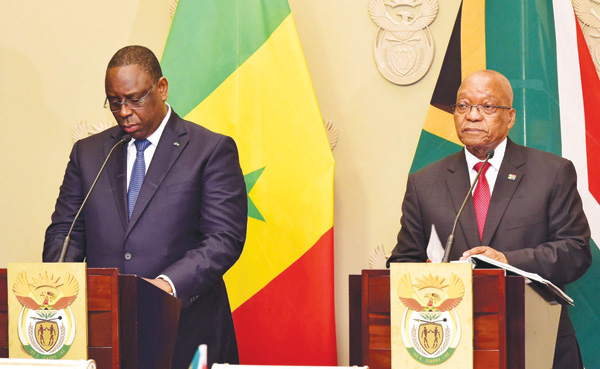 President Jacob Zuma painted a positive picture about the bilateral relationship that exists between South Africa and Senegal.
President Jacob Zuma painted a positive picture about the bilateral relationship that exists between South Africa and Senegal.
“We are generally happy with the state of our bilateral relations,” he said.
South Africa and Senegal enjoy cordial bilateral political, economic and social relations underpinned by strong historical ties dating back to the years of the liberation struggle.
President Zuma said the main objective of the state visit was to review the co-operation between the two countries and reflect on the progress made and discuss new areas of co-operation.
“During our discussions, we focused on a wide range of bilateral, continental and global issues of common interest. We have noted the dynamism that characterises our relations as evidenced by our regular consultations on issues of mutual interest, particularly issues affecting the wellbeing of the beloved continent.
“The dynamism we are talking about relates but is not limited to the progress made in strengthening the relations between our two countries, especially in the field of arts and culture,” President Zuma said.
He said considering the strong historical bonds between the two countries and the collective desire to forge closer co-operation and partnership, they have decided to elevate their Joint Commission for Bilateral Co-operation to the level of ministers.
“We believe that this will give the required push to enhancing our co-operation,” he said.
President Zuma said they are also committed to ensuring that all 14 of the signed sectoral agreements and memoranda of understanding (MoU) are fully implemented.
“We have just witnessed yet another signing of a legal instrument, in this case the MoU in the field of tourism. We welcome this MoU, which will foster co-operation and the sharing of expertise in the exchange of tourism information, tourism promotion and partnership investments in the sector.
“We believe that both countries stand to benefit a lot from the agreement and hope that not only will it be beneficial to the people working in the tourism sector, but also for the average citizen wishing to explore the other’s beautiful country,” he said.
The visit of President Sall took place after the successful commemoration of the 30th anniversary of the Dakar Talks in June 2017, which were held in Senegal.
The Dakar Talks are widely considered to have paved the way towards a negotiated settlement between the ANC and the then government of South Africa.
Trade relations
Trade between South Africa and Senegal has been steadily increasing since 2010. In 2016, South Africa exported goods to the value of R 1.7 billion to Senegal while importing goods to the value of R29 million from that country.
South African exports consist of, amongst others, fresh produce, manufacturing equipment and household appliances. South African imports from Senegal are mainly household furniture and effects, textile materials and original sculptures.
South African companies and entities operating in Senegal include DSTV, South African Airways and Transnet.
SA keen to attract investment
SA keen to attract investment lebangAfrica news / International relations
Promoting trade between SA and Russia
Ambassador Nomasonto Sibanda-Thusi says South Africa invests in international trade and investment missions to attract investment.
“As representatives of the government of South Africa, we are entrusted with the task of enhancing political and economic relations between the countries we are posted to.
“Our task is to promote cordial mutual bilateral relations that will enable us to position South Africa as a country of choice for bilateral trade and investment,” said the country’s Ambassador to Russia.
Sibanda-Thusi was speaking to South African businesspeople, who were attending the last day of the Investment and Trade Initiative (ITI) in Novosibirsk, Russia recently.
Organised and funded by the Department of Trade and Industry (dti) the ITI, which got underway on Tuesday, was aimed at increasing exports of agro-processing and clothing and textile products to the Russian market.
Twenty South African companies participated in the mission.
Ambassador Sibanda-Thusi said government invests in trade and investment missions because companies that participate in these missions are able to contribute to growing the economy of South Africa and creating jobs that the country needs very much.
“We identify markets where opportunities exist for the South African value-added products in particular, to be exported to. Once the companies find new export markets for their products, they increase their production which assists in saving jobs, and creating new job opportunities.
“That is the reason why we as government invest in these missions because their positive impact on our economy is far-reaching,” she said.
Businesspeople in the agro-processing, and clothing and textile sectors spent the last day of the ITI visiting two supermarkets with the aim of identifying opportunities of supplying them with products from South Africa.
Fresh Produce Exporters Forum Anton Kruger said he is confident that more produce could be exported to more supermarkets in the Novosibirsk region of Russia.
SA beaches are opened to all racial groups
SA beaches are opened to all racial groups lebangAfrica news / International relations
Thursday, 16 November 1989
President F.W de Klerk announced that South African beaches would be opened to all people across the racial lines. The decision to open the beaches was made after a number of protest multiracial swim-ins by anti-apartheid activists.
He further promised the scrapping of the Separate Amenities Act of 1953, which prevented the sharing of public facilities such as toilets, parks and buses. This meant that in future all South Africans, irrespective of race, would use the same amenities.
Source: SAHistory.org
Curtain lifted on artistic talent
Curtain lifted on artistic talent Estelle GreeffSport, arts and culture
A government programme provides emerging artists a stage from which to launch their creative careers.
Other productions include:
- A Bird with Melodies (jazz) by Ncamisa Nqana: 29 – 30 November
- Am I Free (dance) by Sabelo Maphumulo: 29 November – 10 December
- Roots Echoes (visual arts) by Bridget Makhubela: 01 – 15 December
- ArtSpoken – The Unveiling (poetry) by Marvin Moane: 05 – 06 December
- Nyala O’ (drama) written and directed by Tselane Mashilo: 07 – 18 February 2018
- Infatuation (musical theatre) by Given Maziya & Given Maluleke: 07 – 25 February 2018
- Xova (drama) by Joseph Komani and Sherldon Marema: 22 February – 04 March 2018
- Angola (drama) written and director by Sello Maseko: 28 February – 18 March 2018
- Roots Echoes (visual arts) curated by Sarah Baloyi: 28 February – 18 March 2018
Fight your flab – for free!
Fight your flab – for free! Estelle GreeffSport, arts and culture
The community of Paarl in the Western Cape has been given a helping hand to get into shape.
Getting fit has never been as easy or as fun, say the residents of Paarl. This after the handing over of a new outdoor gym by the Western Cape Department of Cultural Affairs and Sport.
Minister of Cultural Affairs and Sport in the Western Cape Anroux Marais attended the handover.
“Today we are officially opening an environment for sustainable development while promoting healthier living, especially amongst our youth.”
The community faces a number of social challenges, including poverty, substance abuse, teenage pregnancies and gangsterism.
“Together, we have to do the hard yards to provide our youth and the greater Drakenstein community with an alternate healthier lifestyle; a lifestyle that instils hope motivation to want to be better versions of oneself to rise above vulnerable circumstances,” she said.
She urged the community and sport fraternity to take ownership of the facility.
“Let this facility become the safe space needed to increase the social inclusion of all. It offers a free outdoor space in which the community at large can exercise together because essentially we are better together.”
Minister Marias also believes that sport and recreation have proven to contribute to the social inclusion of our diverse population.
The Western Cape Department of Cultural Affairs and Sport allocated over R180 million for the 2017/18 financial year to promote sport development in the province. This includes providing accessible and affordable sport facilities, programmes and services.
The funds will also promote school sport by assisting with structures, competitions, talent identification, development, as well as specific and next-level activities.

